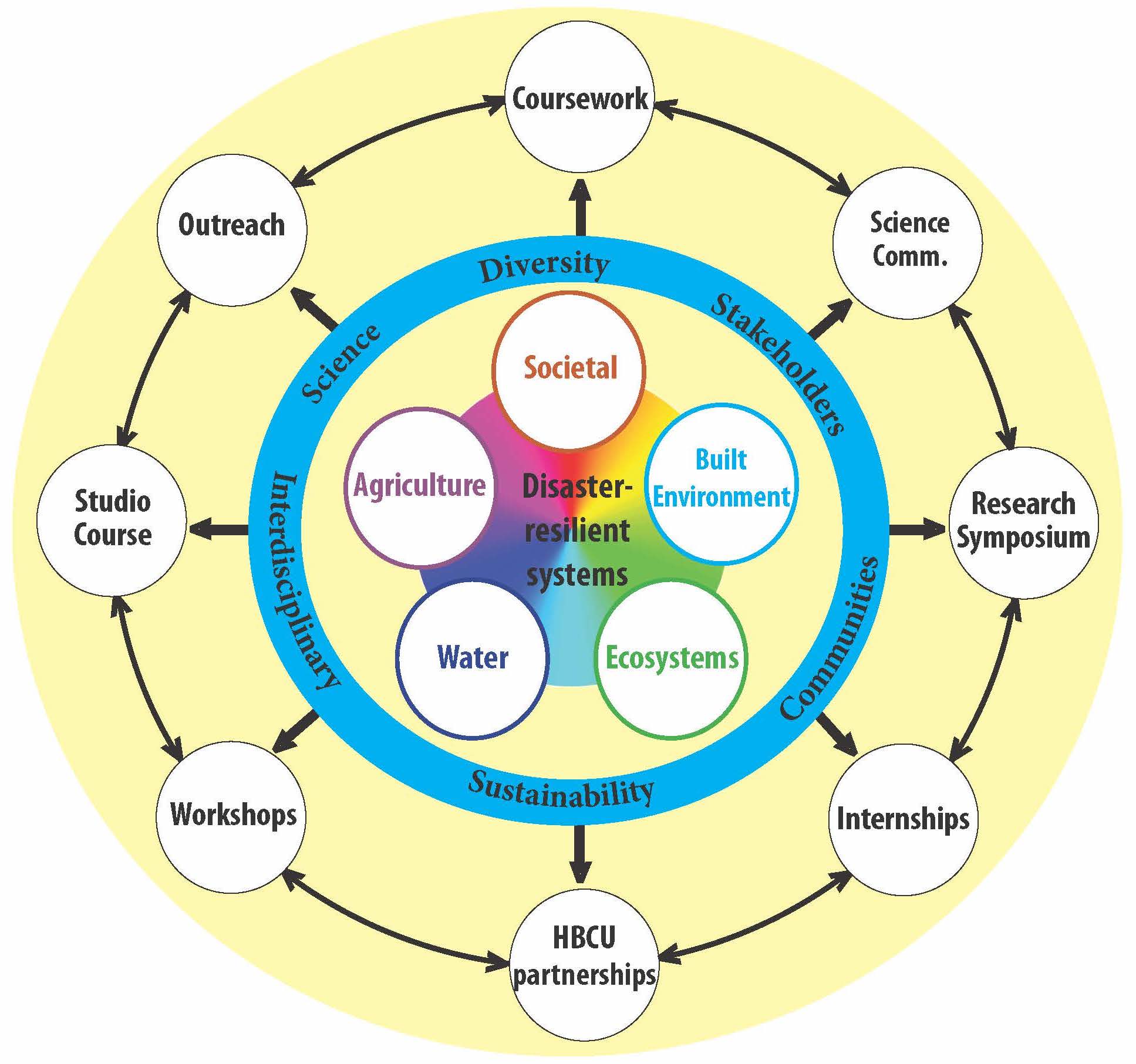About NRT
 This project is a NSF Research Traineeship (NRT) program that aims to train the next generation of scientists and leaders who can help build resilient communities that are prepared for, can effectively respond to, and quickly recover from damaging hazard events in the southeastern United States. MS and PhD students will conduct research within an integrated and multidisciplinary framework with the aim to better understand, predict, and communicate the resilience of natural, social and built environmental systems.
This project is a NSF Research Traineeship (NRT) program that aims to train the next generation of scientists and leaders who can help build resilient communities that are prepared for, can effectively respond to, and quickly recover from damaging hazard events in the southeastern United States. MS and PhD students will conduct research within an integrated and multidisciplinary framework with the aim to better understand, predict, and communicate the resilience of natural, social and built environmental systems.
The project anticipates training approximately eighty-five (85) MS and PhD students which will include eighteen (18) funded trainees across earth systems science, engineering, geosciences, forestry and wildlife sciences, climate science, data science, agriculture, and social science disciplines. The students will conduct research within an integrated and multidisciplinary framework with the aim to better understand, predict, and communicate the resilience of natural, social and built environmental systems. Trainees will learn quantitative and qualitative, analytical, and collaborative skills needed to lead the next generation of scientists and engineers that are able to recognize the data driven decision making needs of stakeholders, as well as to effectively communicate scientific information to stakeholder and public audiences. Trainees will become more sophisticated about inferring the types and magnitudes of climate effects on natural, human and built environmental systems along a variety of temporal and spatial scales while understanding the actionable science needs of relevant stakeholders.
The project will employ a transformative workshop-studio-internship training approach. Two-way exchanges and direct interactions between stakeholders and trainees will occur, exposing trainees to real-world problems and possible career pathways. In addition to working on their directed research, Trainees will take five core courses: (1) a course on resilience and social vulnerability; (2) a course on science communication; (3) a studio course that brings trainees together with stakeholders to address real-world problems, (4) a summer internship working directly with stakeholders, and (5) a series of workshops focused on structured decision-making approaches. Faculty will work with trainees to incorporate cutting-edge research into their theses and will guide them in reflecting on their experiences through the use of modern teaching approaches.
Several important features contribute to this NRT's broad impact and are important key programmatic values. This NRT project values inclusion and diversity, outreach and effective communication, actionable science, and engagement of communities and stakeholders for sustainable climate resilience solutions. In order to ensure this project includes a broad range of perspectives in problem solving and effectively communicating about climate hazards and resilience, mutually benefiting partnerships with HBCU faculty will be established and students from diverse backgrounds and underrepresented groups in STEM are encouraged to apply to the program.
Trainees
To be selected as an Auburn NRT-Climate Resilience Trainee you must complete the application form. Review of applications for funded Trainees will begin on Jan 10 and for un-funded Trainees by the end of April 2022
Funded vs unfunded Trainees
Trainees can be either funded or unfunded trainees, both are prestigious positions. Once accepted as a Trainee, students are considered part of the NRT Traineeship for the entirety of their graduate studies and are expected to fully participate each year. Funded Trainees receive a $34,000 stipend annually for up to two years, qualify for the Auburn graduate out-of-state tuition fellowship and instate-tuition and Auburn fees are paid during the time they are a paid Trainee. Funded Trainees must either be a U.S. citizen or permanent resident. Unfunded Trainees do not receive financial support, but are considered Trainees by the NSF. Both groups of students have the same expectations and qualify to participate in all aspects of the program. All trainees are also eligible for departmental support from their home program in lieu of NRT funding.
Check Out Our Info Presentation:
AU NRT Program Info Slide Show
Recording of Recruitment Info and Q&A
